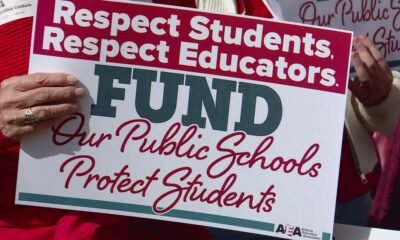ACLU
Lawmakers Greenlight Extensive List of Questions for November Ballot

Arizona legislators have approved the descriptions for the upcoming November ballot questions following a lengthy and often heated debate on Monday.
Lawmakers are mandated to authorize the language composed by their legal teams that summarize the legislative referrals and citizen-led initiatives to be presented to voters.
The current ballot is particularly congested, with Republican lawmakers forwarding 11 legislative referrals to circumvent vetoes by Democratic Governor Katie Hobbs. Many of these issues were originally submitted as conventional legislative bills but were vetoed by Governor Hobbs.
This year’s ballot is anticipated to be two pages long due to the sheer volume of initiatives, alongside local bond overrides and other measures. During a four-hour session, Democrats proposed several amendments to the descriptions, all of which failed.
“It feels like one more uphill battle to try to clarify some stuff,” commented House Democratic Leader Lupe Contreras. In response, Speaker Ben Toma, R-Peoria, said, “We are not going to relitigate or re-debate the bill.”
Proposition Summaries
**Prop 133:** Despite debates over other propositions, Prop 133’s draft language was approved with no discussion. This measure aims to enshrine the current primary election system in the Arizona Constitution, effectively blocking any shift to ranked choice voting.
**Prop 134:** Under Prop 134, a proposed constitutional change would require citizen-led initiatives to gather signatures equal to 10% or 15% of the votes cast in the most recent gubernatorial race in each legislative district, making it harder to place initiatives on the ballot.
**Prop 135:** Addressing the governor’s emergency powers, Prop 135 seeks to limit the governor’s ability to declare emergencies and grants more power to state lawmakers. The amendment lowers the threshold for lawmakers to request a special session from a two-thirds to a one-third majority.
**Prop 136:** This proposition allows challenges to the constitutionality of ballot initiatives at least 100 days before the election. Any initiatives found in violation of the state or U.S. constitutions would be barred from appearing on the ballot.
**Prop 137:** Removing term limits for Arizona judges, Prop 137 introduces conditions for retention votes. Critics argue it is a move to protect specific Supreme Court Justices amid controversial rulings.
**Prop 138:** Prop 138 enables employers to pay tipped workers 25% less than the minimum wage, a significant reduction in pay. This measure has seen strong opposition from Democratic lawmakers, who view it as harmful to tipped employees.
**Prop 311:** This proposition creates a new state death benefit for families of first responders killed in action and imposes a new $20 fee for criminal convictions to fund it. It also heightens penalties for aggravated assault against officers.
**Prop 312:** This measure requires municipalities to provide tax breaks to property owners who incur costs mitigating problems caused by homeless encampments. The financial impact on city budgets has raised concerns.
**Prop 313:** Aiming to address child sex trafficking, Prop 313 mandates life sentences for adults convicted of related class 2 felonies. Critics worry it may unfairly target victims who aid traffickers under duress.
**Prop 314:** This proposition seeks to criminalize unauthorized entry into Arizona through non-official ports by illegal immigrants. Civil rights groups have decried it as harmful to asylum seekers.
**Prop 315:** Prop 315 limits the enactment of state agency rules with costs exceeding $500,000 within five years, subjected to legislative approval for effectiveness.
**One Fair Wage:** Pending confirmation of signature counts, this initiative aims to raise Arizona’s minimum wage from $14.35 to $18 an hour and ensures that tipped workers receive the state minimum wage.
**Arizona Abortion Access Act:** The proposed constitutional amendment seeks to protect abortion rights in Arizona. A significant number of signatures were collected to place this measure on the ballot, challenging the current 15-week ban.
**Make Elections Fair Arizona Act:** This measure proposes eliminating partisan primaries by creating an open primary, allowing for broader voter participation. The draft language passed without opposition.


















